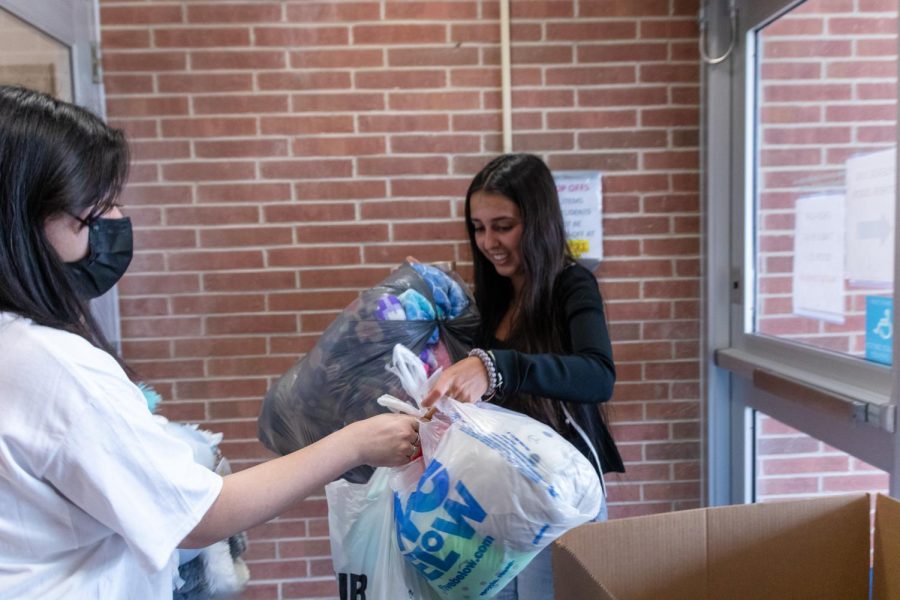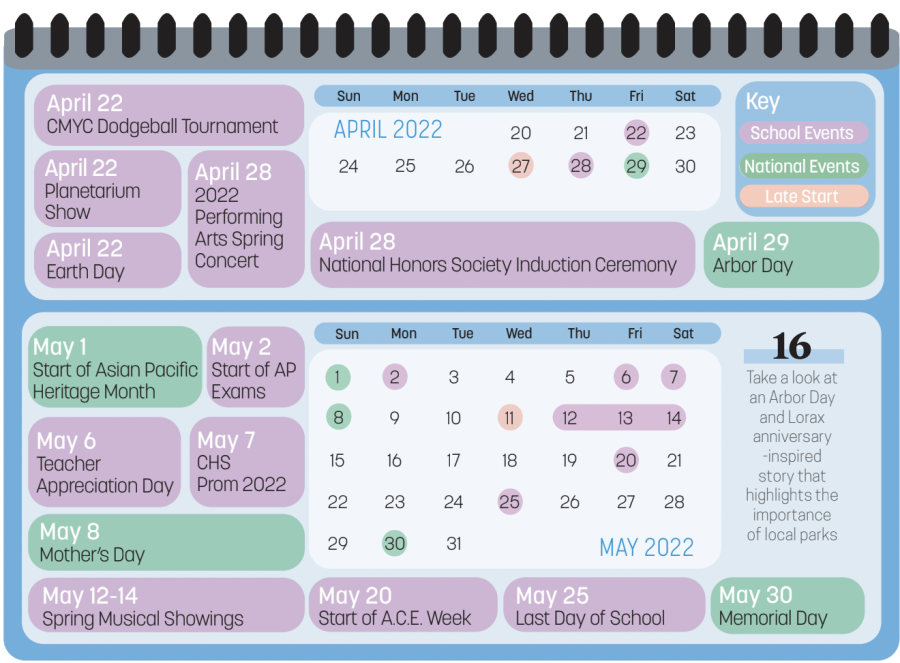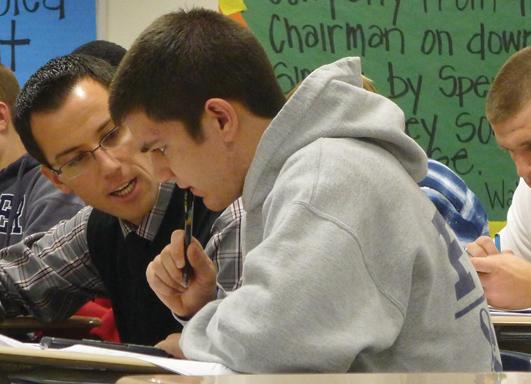Junior Blake Patteson carries his textbook every day to AP U.S. History. It is slightly worn at the corners, 1,248 pages of hard facts graced by a painting of an American flag-adorned winter landscape on the cover. But while the book is important, the course consists of much more than just reading.

For decades, discussions about personal beliefs regarding politics, religion and morals have taken place in American schools. However, the Nov. 6 election presented the need to examine how and why opinions play a role in an academic setting as well as the obligation to draw a line between what is and is not suitable for the classroom.
Patteson said students’ participation in conversations will benefit them long after graduation.
“In the real world, what you know doesn’t matter so much as what you can convey and get others to believe,” he said.
U.S. History teacher Will Ellery said discussion represents a transfer of skills.
“From a larger perspective, education has changed drastically in the last several years from a bulleted list of, for example, in history, ‘They must know A, B, C, D and E’ to now, ‘It would be nice if they knew A, B, C, D and E, but what would be more important is ‘What they do with anything they know, regardless of what A, B, C, D and E are?’” he said. “The development of skill that you get in discussion and debate is critically important now.”
“We certainly need to talk about (politics) and let kids understand all sides of the issues,” Personal Finance teacher Richard “Chard” Reid said.
Ellery said it is difficult to avoid political discussions in class. “All of life is political in some way. Everything comes down to politics at some point.”
While political conversations are vital to Ellery’s classroom, he said teachers should be cautious when addressing sensitive subjects.
“It’s something that teachers should be careful of in that you discuss your personal beliefs, but you are not pushing your beliefs on other people, so you’re offered often as a foil to kids to get them to examine their own beliefs and to be able to weigh in on beliefs,” he said.
“One of the great things about (the) United States’ free and public education is that you can have a free and public and safe discourse about political issues,” Ellery said. “You can support Vermin Supreme through Ron Paul, and while I or anybody else in the room may be in disagreement with you, you are free and comfortable in saying it.”
According to Principal John Williams, boundaries exist between what is and is not proper for discussion.
“I could talk to you about a position on anything, and it might be a good conversation for a teacher and a student to have, but if it crosses over for the teacher using that as an opportunity to convince you or to change your mind or to influence you, that’s really not what we’re supposed to be doing,” he said. “There should be lines, and what those lines would be would be determined by the class and makeup of the class and intent.”
Reid said that teachers should share their beliefs only if students want to hear them, but according to Ellery, everyone in the classroom should be able to speak up.
“You may not agree with anybody’s perspective, but that doesn’t mean that that perspective should not have been offered. It only shouldn’t be offered if you’re not allowed to have your voice, and that’s never the case,” Ellery said.
“That a teacher has a differing opinion doesn’t mean that your ideas are any more or less wrong,” Patteson said. “Words are words. It’s the person listening who gives them their meaning.”
Patteson said he believes that some students will inevitably be offended by teachers’ words.
“If you’re going to live in a society where people have free speech and expect to never get offended ever, then you’re ridiculous,” Patteson said.
Williams said that occasionally, he experiences issues when students take offense at class conversations.
“If somebody comes to me and says, ‘You know, so-and-so said this in class, and it really bothered me,’ my first reaction is, ‘Okay, should it bother them?’ You and I can have a good, intellectual conversation about something that we completely disagree on, and we can still respect each other and listen to each other and maybe even, from that respect, we learn from each other.”
According to Williams, however, teachers respect the lines that separate appropriate conversation from inappropriate.
“(Teachers) do a great job of making sure their role is not to tell you what to think but to help you get to where you can think on your own by exposing you to things you hadn’t thought about, and that’s okay. That’s healthy,” Williams said.



















![Joseph Broman, Mu Alpha Theta sponsor, grades tests for his honors precalculus/trigonometry class. Broman said, “I’m retiring from the Math Club next year and I’m just going to do Mu Alpha Theta so I can focus on that one and we can do more [speaker series] first semester.”](https://hilite.org/wp-content/uploads/2024/03/IMG_9502-1200x900.jpg)











![British royalty are American celebrities [opinion]](https://hilite.org/wp-content/uploads/2024/03/Screenshot-2024-03-24-1.44.57-PM.png)




















![Review: “The Iron Claw” cannot get enough praise [MUSE]](https://hilite.org/wp-content/uploads/2024/04/unnamed.png)
![Review: “The Bear” sets an unbelievably high bar for future comedy shows [MUSE]](https://hilite.org/wp-content/uploads/2024/03/unnamed.png)
![Review: “Mysterious Lotus Casebook” is an amazing historical Chinese drama [MUSE]](https://hilite.org/wp-content/uploads/2024/03/0.webp)
![Thea Bendaly on her Instagram-run crochet shop [Biz Buzz]](https://hilite.org/wp-content/uploads/2024/03/IMG_0165-1200x838.jpg)
![Review: Sally Rooney’s “Normal People,” is the best book to read when you are in a time of change [MUSE]](https://hilite.org/wp-content/uploads/2024/03/20047217-low_res-normal-people.webp)
![Review in Print: Maripaz Villar brings a delightfully unique style to the world of WEBTOON [MUSE]](https://hilite.org/wp-content/uploads/2023/12/maripazcover-1200x960.jpg)
![Review: “The Sword of Kaigen” is a masterpiece [MUSE]](https://hilite.org/wp-content/uploads/2023/11/Screenshot-2023-11-26-201051.png)
![Review: Gateron Oil Kings, great linear switches, okay price [MUSE]](https://hilite.org/wp-content/uploads/2023/11/Screenshot-2023-11-26-200553.png)
![Review: “A Haunting in Venice” is a significant improvement from other Agatha Christie adaptations [MUSE]](https://hilite.org/wp-content/uploads/2023/11/e7ee2938a6d422669771bce6d8088521.jpg)
![Review: A Thanksgiving story from elementary school, still just as interesting [MUSE]](https://hilite.org/wp-content/uploads/2023/11/Screenshot-2023-11-26-195514-987x1200.png)
![Review: When I Fly Towards You, cute, uplifting youth drama [MUSE]](https://hilite.org/wp-content/uploads/2023/09/When-I-Fly-Towards-You-Chinese-drama.png)
![Postcards from Muse: Hawaii Travel Diary [MUSE]](https://hilite.org/wp-content/uploads/2023/09/My-project-1-1200x1200.jpg)
![Review: Ladybug & Cat Noir: The Movie, departure from original show [MUSE]](https://hilite.org/wp-content/uploads/2023/09/Ladybug__Cat_Noir_-_The_Movie_poster.jpg)
![Review in Print: Hidden Love is the cute, uplifting drama everyone needs [MUSE]](https://hilite.org/wp-content/uploads/2023/09/hiddenlovecover-e1693597208225-1030x1200.png)
![Review in Print: Heartstopper is the heartwarming queer romance we all need [MUSE]](https://hilite.org/wp-content/uploads/2023/08/museheartstoppercover-1200x654.png)























![Review: Ladybug & Cat Noir: The Movie, departure from original show [MUSE]](https://hilite.org/wp-content/uploads/2023/09/Ladybug__Cat_Noir_-_The_Movie_poster-221x300.jpg)

![Review: Next in Fashion season two survives changes, becomes a valuable pop culture artifact [MUSE]](https://hilite.org/wp-content/uploads/2023/03/Screen-Shot-2023-03-09-at-11.05.05-AM-300x214.png)
![Review: Is The Stormlight Archive worth it? [MUSE]](https://hilite.org/wp-content/uploads/2023/10/unnamed-1-184x300.png)




